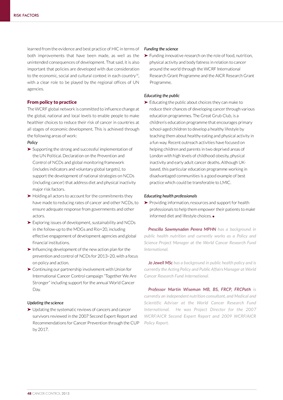
RISK FACTORS
learned from the evidence and best practice of HIC in terms of Funding the science
both improvements that have been made, as well as the ‰ Funding innovative research on the role of food, nutrition,
unintended consequences of development. That said, it is also physical activity and body fatness in relation to cancer
important that policies are developed with due consideration around the world through the WCRF International
18
to the economic, social and cultural context in each country , Research Grant Programme and the AICR Research Grant
with a clear role to be played by the regional offices of UN Programme.
agencies.
Educating the public
From policy to practice ‰ Educating the public about choices they can make to
The WCRF global network is committed to influence change at reduce their chances of developing cancer through various
the global, national and local levels to enable people to make education programmes. The Great Grub Club, is a
healthier choices to reduce their risk of cancer in countries at children’s education programme that encourages primary
all stages of economic development. This is achieved through school-aged children to develop a healthy lifestyle by
the following areas of work: teaching them about healthy eating and physical activity in
Policy a fun way. Recent outreach activities have focused on
‰ Supporting the strong and successful implementation of helping children and parents in two deprived areas of
the UN Political. Declaration on the Prevention and London with high levels of childhood obesity, physical
Control of NCDs and global monitoring framework inactivity and early adult cancer deaths. Although UK-
(includes indicators and voluntary global targets), to based, this particular education programme working in
support the development of national strategies on NCDs disadvantaged communities is a good example of best
(including cancer) that address diet and physical inactivity practice which could be transferable to LMIC.
major risk factors.
‰ Holding all actors to account for the commitments they Educating health professionals
have made to reducing rates of cancer and other NCDs, to ‰ Providing information, resources and support for health
ensure adequate response from governments and other professionals to help them empower their patients to make
actors. informed diet and lifestyle choices. l
‰ Exploring issues of development, sustainability and NCDs
in the follow-up to the MDGs and Rio+20, including Prescilla Sawmynaden Perera MPHN has a background in
effective engagement of development agencies and global public health nutrition and currently works as a Policy and
financial institutions. Science Project Manager at the World Cancer Research Fund
‰ Influencing development of the new action plan for the International.
prevention and control of NCDs for 2013–20, with a focus
on policy and action. Jo Jewell MSc has a background in public health policy and is
‰ Continuing our partnership involvement with Union for currently the Acting Policy and Public Affairs Manager at World
International Cancer Control campaign “Together We Are Cancer Research Fund International.
Stronger” including support for the annual World Cancer
Day. Professor Martin Wiseman MB, BS, FRCP, FRCPath is
currently an independent nutrition consultant, and Medical and
Updating the science Scientific Adviser at the World Cancer Research Fund
‰ Updating the systematic reviews of cancers and cancer International. He was Project Director for the 2007
survivors reviewed in the 2007 Second Expert Report and WCRF/AICR Second Expert Report and 2009 WCRF/AICR
Recommendations for Cancer Prevention through the CUP Policy Report.
by 2017.
48 CANCER CONTROL 2013